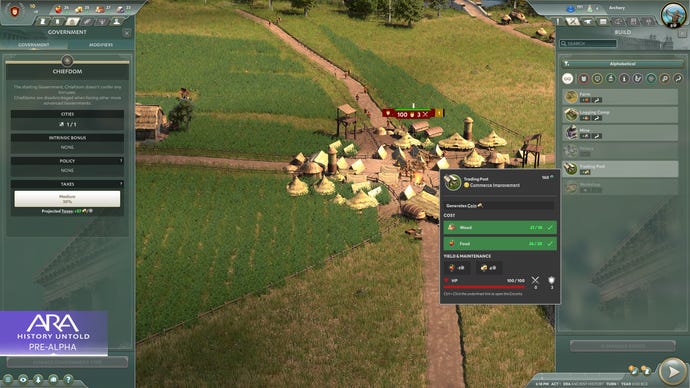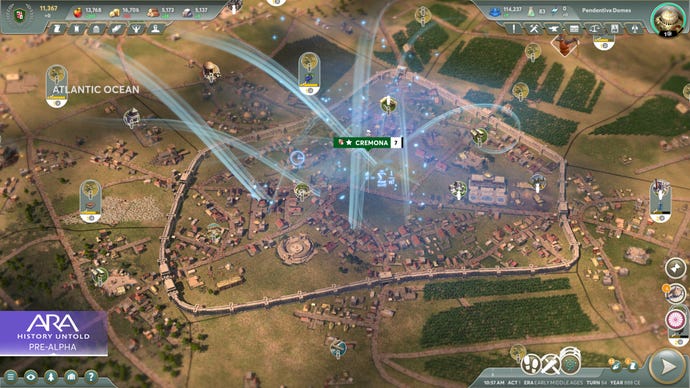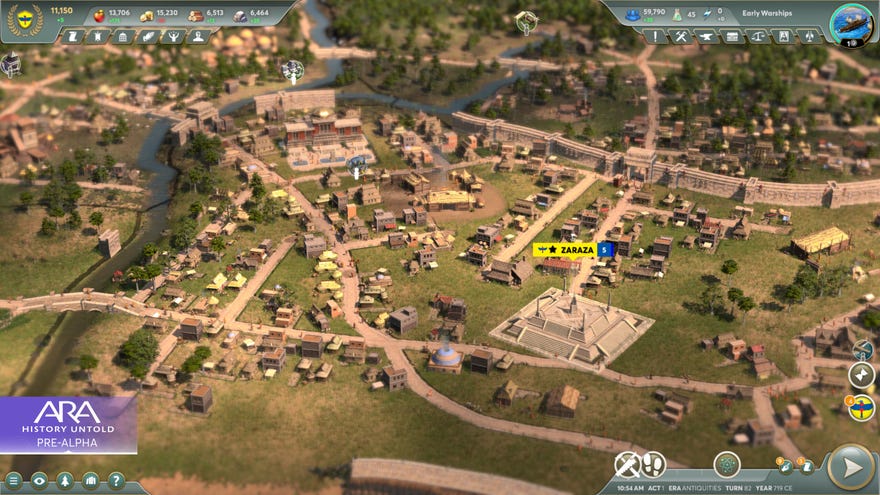How Oxide survived the "nightmare" of making a simultaneous-turn 4X game
"I think every single year, for three years straight, we took an additional shot at it."
Ara: History Untold's headline gimmick is actually a couple of centuries old. In this deceptively Civilization-esque 4X strategy game, all player turns unfold simultaneously, once you've decided what to build or research, where to move your units, and so on. As Oxide Games design director Michelle Menard tells me over Zoom, this approach takes inspiration from an ancient military simulator, Kriegsspiel, which was devised by the Prussian army officer George Leopold von Reisswitz, aka the "father of wargaming", in the mid-1800s.
"It was to train their generals, it was a legit apparatus of war, it was not for funsies," says Menard. "And they basically created this massive table that had a modular terrain system. At first they used sand, but that was kind of messy, [and so] they developed a system where they had interchangeable tiles, like hills and valleys and plateaus.
"They would build out this table, literally drop a sheet down the middle, and it'd be like, OK, you guys on each side, you can't see what the other person's doing. There was an actual game master, who was the referee who you would report your moves to. He would then re-set up the board and basically call people back into the room and be like, tada! It's the next turn - let's see what people did. Was it what you expected?"
You probably didn't read it here first: the original fog of war was, in fact, a sheet of war.
Ara: History Untold looks to recapture these past glories, which is somewhat sinister when you consider that several of the studio's staff have experience creating software for the modern military sector - naturally, the developers aren't prepared to discuss those contracts during our interview. But it's enticing, too, in that Oxide hope to develop a 4X eXperience that is more surprising, faster-paced and fairer, by overturning certain long-established grand strategy play patterns, and introducing a careful element of opacity.
"When you play other games that have serial turns, there's always this bias that comes into play, depending on who gets to go first," Menard explains. "You get to see what the other person does and readjust your strategy. Whereas if you're all having to plan and make your choices at the same time, it is forcing you to reevaluate the situation at hand every single time you play."
While Oxide have access to more sophisticated tools than hanging sheets, the simultaneous-turn system is the result of much blood, sweat and tears. The developers fancied their chances going in, according to chief graphics architect Dan Baker - they have ample strategy game experience to call upon, after all, from their debut RTS Ashes Of The Singularity to their founders' previous roles at Firaxis, grinding away at Civilization's coalface. But Baker and his colleagues were caught out by the scale of the task in practice.
"I don't think we appreciated how difficult it was," he says. "Because what you have to actually do is build the entire system such that because the orders don't happen immediately, you've got to have an intermediate way of storing them, and effectively almost have the ability to undo things. From an engineering standpoint, it ended up being a huge challenge for us to build the simultaneous turn. And we started to realise when we got really into it, why you don't see [games like this], because it is such a difficult problem to deal with, just technically."
It's been a "nightmare" for the game designers too, lead designer Michael Califf says. "I think every single year, for three years straight, we took an additional shot at how we're structuring everything that gets done in that period of time." One principle Oxide had to establish was that certain things would in fact play out as envisaged by each player, regardless of what madness occurs when you and the other players hit the button to resolve your collective choices. This partly came down to finding the right order of resolution for actions and interactions such as production or research, to avoid blind-siding the player with counter-intuitive knock-on effects.

Califf gives the relatively simple example of how the choice of running order might affect the behaviour of a single resource-generating structure. "If you were building a logging camp, and that logging camp finishes building, based on the structure that we had for a while, the logging camp would finish in the turn order, prior to resources being generated or maintenance being consumed by buildings," he says. "And so it would actually both finish construction and then produce in the space of a single turn.
"So some of it was about clarifying that, no, we're not going to have any interactions like that, if you see that your logging camp has one turn left until it's built, it does one thing in between turns, and all it does is get built - it will not produce." Califf has spent many months fiddling with nuances like this. "At some point about this time last year, I just had splattered across the entire floor of my office sheets and sheets of paper, arranging the order and like, defining the groupings and actions that need to take place, and why they need to take place in this order, to adhere to that principle that what you see is what you get."
It's even more of a headache, of course, when you start thinking about more direct interactions between players - shuffling armies around, conquering territory, and performing diplomatic interventions that might redraw the web of alliances. "How do you process those three things in the right order to make sure that what comes out on the other end makes sense to the player?" Califf says. "It's like, oh, this army was trying to move here. But this land was claimed by this person, and this person changed their diplomatic state with you, all in the space of one turn. Resolve that and tell the player how that works, right? That kind of situation is where the absolute nightmare comes in, and that took a long time."
It's important, obviously, that some of these interactions feel genuinely disruptive and startling, while ensuring that they aren't so chaotic as to make conflict utterly impenetrable. In the current version of Ara, actions such as diplomacy state changes, army movements and land being claimed happen early in the turn resolution process. This theoretically allows players to interfere with each other in a way you can broadly anticipate - if you have a hostile legion on your doorstep, for instance, you'll know they have the ability to mess with any building operations you have near completion.
Simultaneous turns aren't Oxide's only gamble with Ara: History Untold. As Menard explains, the studio have experimented with introducing ideas from "sister or adjacent genres" and roguelikes, though she doesn't go into detail. "We're picking out little things here or there that are really good for these kinds of player behaviours and dynamics," she says. "Are there ways we can incorporate these learnings into a 4X title to make it more engaging, make it feel more modern, make it more accessible for a larger, broader audience? Because that is something we wanted to do, not just make a game for core 4X people, though we definitely want to support them."
The studio have also done away with the traditional 4X grid-based map, which Baker compares to staring at a field of egg cartons. Instead, Ara's strategic playspaces are defined by regions, placed atop the geography. This may sound straightforward enough to implement, but the complicating factor is that Ara's maps are also procedurally generated. "It's not so hard to build Europe by hand with an artist doing it," Baker says. "But when you're actually having to do a map procedurally, it's just an incredibly difficult problem, in every way it makes the game challenging."
Ara's generated regions are defined by ethereal play principles such as the number of neighbouring regions they're allowed to have, or the number of player-built improvements they can sustain. But they also try to follow the topography in a naturalistic fashion, adhering to coastlines, rivers and a balance of high and low ground that is based on simulated plate tectonics.

"Just the amount of technology we had to throw at just making that work and you don't have a regular grid, so the cities have to grow organically, roads have to grow organically," says Baker. "It was a really, really tough challenge, but it makes a big difference." Oxide's hope is that the blend of abstract regions and procgen will make for a more readable, less abstract play environment, with less need to look up terrain tiles in a codex. "We'll preferably get to a state where you don't need to see all of the UI that we put into the world," suggests Califf. Menard estimates that there's been as many or more "major iterations" upon Ara's map design as on the simultaneous turn system. "I never want to hear the word about river iteration ever again in my life," she summarises. "Oh my God, rivers!"
I have yet to lay hands on Ara: History Untold, and I have to say, when I caught the announcement trailer, it struck me as quite familiar - Civilization again, but with a more fluid and bustly approach to units and settlement design that recalls the Age of Empires series. Having heard about what's going on beneath the hood, I'm much more intrigued, though I do struggle to visualise many of the tortuous running-order considerations described above.
One other question I'm left with is whether Oxide might whip away the sheet and open up the workings of simultaneous turns to players. Have the studio considered letting people alter the sequence of actions and interactions per turn in the settings, so as to come up with different flavours of 4X temporality, and different strategic or tactical pressures?
It's not on the to-do list, apparently, but there's a foundation here that modders might build on. Oxide have devised a special "mini language" to define the interactions during turn resolution, Baker says, which modders could harness for their own purposes. "There is definitely the potential to mess around with it, to some extent. Be curious what people do - we came up with a very specific way, but yeah, I think players could try interesting things." You'll very much tamper at your own risk, however. As Califf concludes: "I couldn't speak to the results of it, if they chose to mess around."





